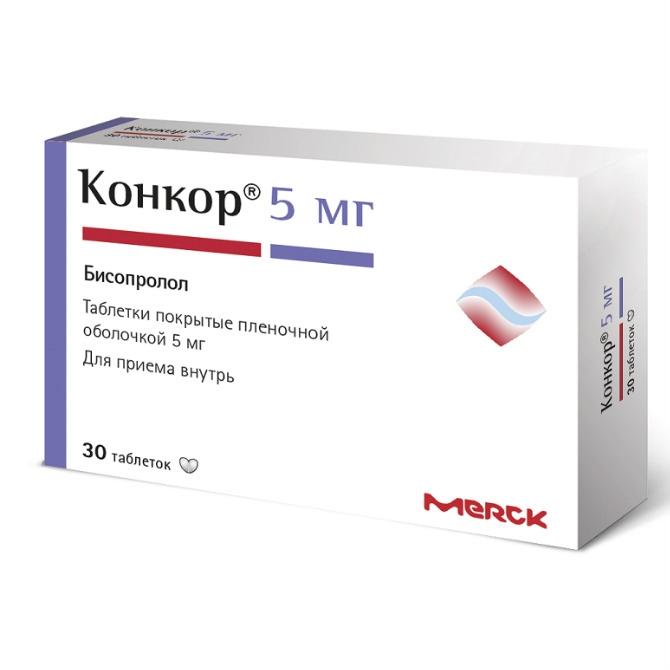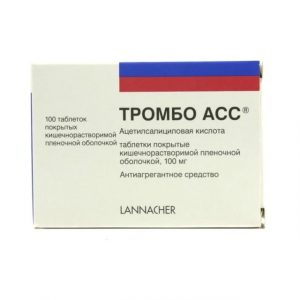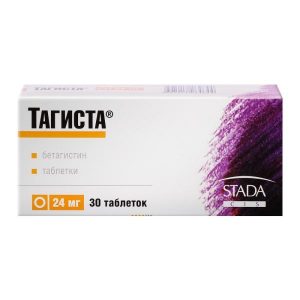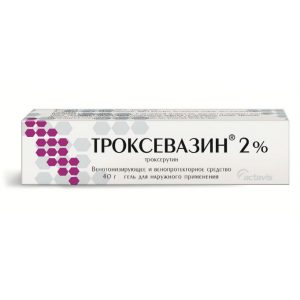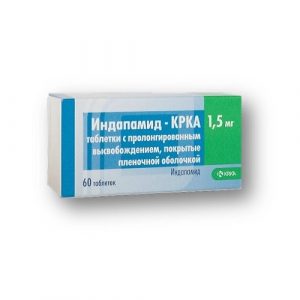Description
release form
Tablets
Packing
30 pcs
Pharmacological action
Concor – selective beta1-blocker. When used in therapeutic doses, it does not have internal sympathomimetic activity and clinically significant membrane-stabilizing properties.
After oral administration, the action develops after 1-3 hours and lasts for 24 hours.
It has a hypotensive effect due to a decrease in cardiac output, inhibition of renin secretion by the kidneys, and effects on the aortic arch and carotid sinus baroreceptors. With prolonged use, Concor reduces initially increased OPSS.
Has an antianginal effect. Reduces myocardial oxygen demand by lowering heart rate, lowering cardiac output and lowering blood pressure. Increases myocardial oxygen supply by reducing the final diastolic pressure and lengthening the diastole.
In chronic heart failure, Concor suppresses the activated sympatho-adrenal and renin-angiotensin-aldosterone systems, which leads to an improvement in the course of the disease.
Indications
arterial hypertension
CHD (angina pectoris)
chronic heart failure.
Contraindications
shock
AV block II and III degree
SSSL
pronounced sinoatrial blockade
tendency to bronchospasm (bronchial asthma, obstructive respiratory diseases)
late stages of peripheral obstructive disease (concurrent)
if there is a history of psoriasis in the patient or his relatives (use of beta-blockers, including Concor Cor, should only be done after a careful assessment of the benefit-risk ratio of
pheochromocytoma (administration of Concor Cor to patients with pheochromocytoma is permitted only after taking alpha-adrenergic blocking agents)
in patients with chronic heart failure Concor Cor should not be used for exacerbation of heart failure or during episodes of heart failure decompensation in which iv administration of drugs is required that affect myocardial contractility, in addition, for patients with chronic heart failure the use is contraindicated in the use of Concor Cor in bradycardia if the pulse is less than 50-60 / min and with arterial hypotension if the systolic blood pressure is less than 90-100 mm Hg. Art. should only be done after a careful assessment of the benefit-risk ratio of
pheochromocytoma (administration of Concor Cor to patients with pheochromocytoma is permitted only after taking alpha-adrenergic blocking agents)
in patients with chronic heart failure Concor Cor should not be used for exacerbation of heart failure or during episodes of heart failure decompensation in which iv administration of drugs is required that affect myocardial contractility, in addition, for patients with chronic heart failure the use is contraindicated in the use of Concor Cor in bradycardia if the pulse is less than 50-60 / min and with arterial hypotension if the systolic blood pressure is less than 90-100 mm Hg. Art. should only be done after a careful assessment of the benefit-risk ratio of
pheochromocytoma (administration of Concor Cor to patients with pheochromocytoma is permitted only after taking alpha-adrenergic blocking agents)
in patients with chronic heart failure Concor Cor should not be used for exacerbation of heart failure or during episodes of heart failure decompensation in which iv administration of drugs is required that affect myocardial contractility, in addition, for patients with chronic heart failure the use is contraindicated in the use of Concor Cor in bradycardia if the pulse is less than 50-60 / min and with arterial hypotension if the systolic blood pressure is less than 90-100 mm Hg. Art.
Use during pregnancy and lactation
Should not be prescribed Concor during pregnancy and lactation (breastfeeding) due to the lack of clinical experience with the drug in this category of patients.
In exceptional cases of Concor use during pregnancy, treatment should be discontinued 72 hours before the expected date of delivery due to the possibility of bradycardia, hypoglycemia and respiratory depression in the newborn. If drug withdrawal is not possible, then after delivery, the newborn should be closely monitored. Symptoms of hypoglycemia can be expected within the first 3 days.
Composition
1 tablet contains:
Active ingredient: bisoprolol fumarate 5 mg
Excipients: colloidal silicon dioxide, magnesium stearate, crospovidone, microcrystalline cellulose, corn starch, calcium hydrophosphate 400 mg, dimethyl hydrogen phosphate, dimethyl phosphate, molybdenum phosphate, molybdenum phosphate, molybdenum phosphate, molybdenum phosphate, molybdenum oxide, molybdenum phosphate, sodium hydroxide methyl hydroxypropyl cellulose.
Side effects
From the central nervous system and peripheral nervous system: possible (especially at the beginning of the course of treatment) feeling tired, dizziness, headache, sleep disturbance, depression rarely – hallucinations. Typically, these phenomena are mild and pass, usually within 1-2 weeks.
From the side of the organ of vision: rarely – visual impairment, decreased lacrimation (should be taken into account when wearing contact lenses), conjunctivitis.
From the cardiovascular system: in some cases, orthostatic hypotension, bradycardia, impaired AV conduction, decompensation of heart failure with the development of peripheral edema, paresthesia and a feeling of cold in the extremities are possible. At the beginning of treatment, deterioration in patients with intermittent claudication or with Raynaud’s syndrome is possible.
From the respiratory system: rarely – shortness of breath (in patients with a tendency to bronchospasm, including with bronchitis with bronchial obstructive syndrome).
From the digestive system: in some cases – diarrhea, constipation, nausea, abdominal pain, increased activity of liver enzymes in blood plasma (AST, ALT), hepatitis.
From the musculoskeletal system: in some cases – muscle weakness, muscle cramps, arthropathy with damage to one or more joints (mono – or polyarthritis).
From the endocrine system: decreased glucose tolerance (with latent diabetes mellitus) and masked signs of hypoglycemia in some cases – increased triglycerides in the blood.
From the reproductive system: in some cases – a violation of potency.
Dermatological reactions: itching is rare – redness of the skin, increased sweating, rash.
Drug Interaction
When used concurly, Concor can enhance the effect of antihypertensive drugs.
With a concurrent use of Concor and reserpine, alpha-methyldopa, clonidine, digitalis or guanfacine, a sharp decrease in heart rate may occur.
Conductivity disorders are also possible with concurrent administration of clonidine and clonidine, digitalis, and guanfacine.
Concurrent use of sympathomimetics (including those contained in cough remedies, nasal drops and eye drops) may reduce the effect of bisoprolol.
When co-administered with nifedipine and other calcium channel blockers, dihydropyridine derivatives may enhance the antihypertensive action of Concor.
With concurrent use of Concor and verapamil or diltiazem and other antiarrhythmic drugs, a sharp decrease in blood pressure, a decrease in heart rate, as well as the development of arrhythmia and / or heart failure (requires careful supervision of a doctor). Calcium channel blockers and antiarrhythmic drugs should not be given in / on the background of Concor therapy.
With concurrent use of Concor and clonidine, the latter can only be withdrawn if Concor has been completed a few days before, due to the risk of excessive elevation of blood pressure.
When concomitant use of ergotamine derivatives (including ergotamine-containing migraine treatment agents) and Concor may increase peripheral circulation disorders.
A slight decrease in T1 / 2 bisoprolol may be required with concurrent administration of concor and rifampicin (no concurrent dose increase is usually required).
Increased hypoglycaemic effects may occur when concur and insulin or oral hypoglycemic agents are administered concomitantly. The symptoms of hypoglycemia are masked or mitigated (regular monitoring of blood glucose levels).
Overdose
Symptoms: most commonly AV blockade, severe bradycardia, severe BP, bronchospasm, acute heart failure and hypoglycemia. The sensitivity to a single high dose of bisoprolol varies greatly among individual patients and is likely to be high in patients with chronic heart failure.
Treatment: if overdose occurs, first of all, it is necessary to discontinue the drug and start supportive symptomatic therapy.
At expressed bradycardia – in / in introduction of atropine. If the effect is insufficient, then with caution it is possible to enter a means having a positive chronotropic effect. Occasional staging of an artificial rhythm driver may be required.
With a marked decrease in blood pressure, the introduction of plasma-replacement solutions and vasopressor drugs.
With AV blockade, there is ongoing clinical control, the appointment of beta-adrenomimetics such as epinephrine. If necessary – production of an artificial rhythm driver.
In the exacerbation of the course of chronic heart failure – in / in the introduction of diuretics, drugs with a positive inotropic effect, as well as vasodilators.
In bronchospasm – the appointment of bronchodilators, incl. 2-adrenomimetics and / or aminophylline.
In hypoglycemia – in / in the introduction of dextrose (glucose).
Storage conditions
The drug should be stored out of the reach of children.
Expiration
5 Chron
Deystvuyuschee substances
bisoprolol
Dosage form
Dosage form
tablets
Merck KGAa, Russia
